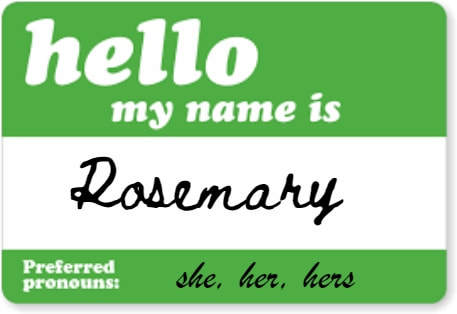What Gender Identity Means for Grammar...
 Today I ponder gender identity. And what it means for the future. If you haven’t noticed, the world is changing, and hopefully, becoming more aware and accepting and tolerant. I work in a liberal environment, and in an establishment that recognizes this. It’s as natural as breathing where I live and function. But I realize it’s not so in other parts of our beloved country. And to me, that is tragic.
Today I ponder gender identity. And what it means for the future. If you haven’t noticed, the world is changing, and hopefully, becoming more aware and accepting and tolerant. I work in a liberal environment, and in an establishment that recognizes this. It’s as natural as breathing where I live and function. But I realize it’s not so in other parts of our beloved country. And to me, that is tragic.But I’m not asking about whether you believe in the changes. What I wonder is how the changing world is going to handle this in writing and in speaking. Having taught now for 7 years, I see the trends from when I first started teaching to now. As English teachers around the country used to cringe when pronouns didn’t match in number (one is he or she not they), in writing or public speaking, we’ve started to loosen our grip on those “rules.” While we’ve certainly learned a long time ago that “man” and “he” no longer apply to men AND women, it started to become cumbersome to ALWAYS have to write “he” or “she” or say “he” or “she.” We finally agreed—Okay. Okay. Use “they” if you must but change it to people or persons to match! And that can work…but it’s not. Trust me.

 As colleges around the country (including mine) change with the times, now we allow students to tell us what pronouns they use. In fact, it’s the first thing we do at orientation days—hand out name tags and ask students to write their pronouns. And further, our class rosters, now allow students to have the names they’d like used, rather than the name they were given at birth (Records holds the “real” names for tax purposes, financial aid, and the like.) In addition, many emails from professors are also signed with the pronouns they’d like to go by or be addressed with. All fine. Great. Inclusive acceptance. But let’s face it. This is getting too wordy and a little ridiculous. Not because I don’t believe in the idea of it, the idea that people should be who they ARE, but that perhaps we need one pronoun. Period. Language morphs with civilizations. Surely, we could pick one pronoun for singular and one pronoun for plural? Couldn’t we?
As colleges around the country (including mine) change with the times, now we allow students to tell us what pronouns they use. In fact, it’s the first thing we do at orientation days—hand out name tags and ask students to write their pronouns. And further, our class rosters, now allow students to have the names they’d like used, rather than the name they were given at birth (Records holds the “real” names for tax purposes, financial aid, and the like.) In addition, many emails from professors are also signed with the pronouns they’d like to go by or be addressed with. All fine. Great. Inclusive acceptance. But let’s face it. This is getting too wordy and a little ridiculous. Not because I don’t believe in the idea of it, the idea that people should be who they ARE, but that perhaps we need one pronoun. Period. Language morphs with civilizations. Surely, we could pick one pronoun for singular and one pronoun for plural? Couldn’t we?
When I first started watching Billions, and Taylor used “they” and all forms of it to identify “their” non-binary gender (and none of the other actors/characters blinked when using it themselves)—I thought—yes! Brilliant. So why can’t we all? What difference does it make? It would take time. It might take work. But give it a few years…and—guess what? Just like words like tweets or selfie or binge-watching or photo bombing or a million others didn’t exist before, so, too, could this change. Rosemary O’Brien for president you say? LOL. Nah. Warren is on “their” way.
Published on October 17, 2019 06:37
No comments have been added yet.



